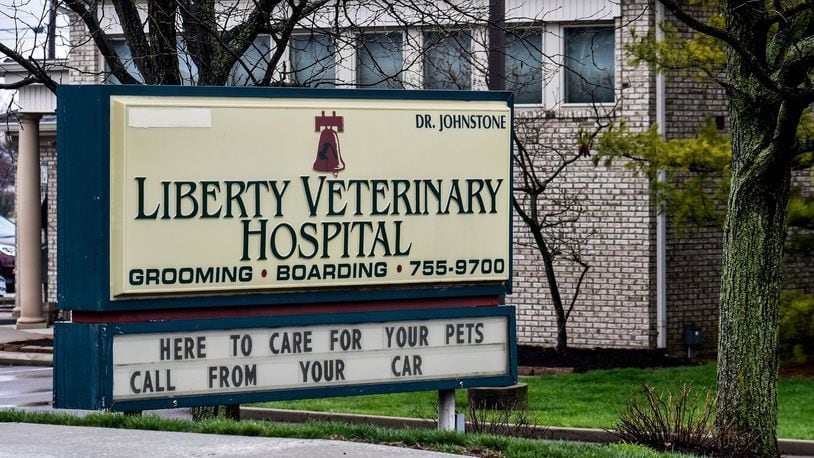Then everything is done over the phone — from the veterinarian explaining examination results to payment.
CORONAVIRUS: This Ohio innovation is capturing the nation’s attention
“That keeps the amount of contact to the bare minimum, and you don’t have waiting rooms co-mingled with people with their animals in a smaller space,” said Ohio Veterinary Medical Association Executive Director Jack Advent. He said anything that can be postponed, such as dental cleanings and well checks for healthy animals.
A pet’s health should also be monitored just like other members of a family, said Dr. Amy Johnstone, veterinarian/owner of Liberty Veterinary Hospital on Yankee Road in Liberty Twp. If there are any symptoms of illness, then call.
“You may not want to bring your animal into a routine exam at this time; you might put that off,” she said.
While there aren’t any mandated guidelines, Johnstone said there are suggested guidelines highlighted by the OVMA and the American Veterinary Medical Association, including curbside visits. She said many clinics formulate individual policies based on the suggested guidelines.
“Most of the veterinary community is starting to institute these, nothing is official that we have to (enact these protocols),” Johnstone said.
Liberty Veterinary will use facility-owned leashes and collars to bring the pet into the facility.
“Our building is basically locked, and only employees are allowed in,” Johnstone said.
Johnstone said based on the latest information, it’s unlikely the virus could be transferred from a pet’s fur, but they’re asking clients if anyone in the household is sick or exposed to anybody with COVID-19 before the appointment.
“If somebody is sick and we have to see the animal, we’re going to use protective equipment and wipe the animal down with chlorhexidine, a type of mousse that will hopefully disinfect,” she said.
The AVMA recommends limited contact with pets if you have the COVID-19 virus “until more information is known about the virus.” Anyone with a service animal or caring for a pet should wear a facemask and do not share food, or kiss or hug them. It’s also recommended to wash your hands before and after contact.
Financial lifeline: How Butler County governments, organizations are addressing the need
Advent’s organization has asked vets to consider telemedicine to bring the risk of COVID-19 exposure down further.
Not all veterinary facilities are participating in telemedicine. However, some are, and Advent said they're encouraging a video discussion where veterinarians can assess an animal "it'sto minimize that need to come into the clinic."
West Chester Veterinary Center is offering 10-minute video consultation appointments “so that your pet’s health can be assessed by one of our vets in the comfort and safety of your own home,” according to the clinic’s website. A veterinarian could not be reached for further comment, but the website indicates if concerns could not be addressed during the video consultation, they’ll request to see the animal for a physical exam, which would not be an extra charge if it’s a same-day appointment.
Dr. Reed Hughes, veterinarian at Brookside Animal Hospital in Hamilton, has concerns about telemedicine, but thinks it’s only being talked about now because of the COVID-19 crisis.
“It could really be a problem,” he said. “Sometimes it’s hard enough to diagnose those tricky issues, but when you try to do it from a distance, it could open the door for misdiagnosis.”
It’s even hard if he’s seen an animal on a consistent basis for years because he’d need to do a blood test or some other tests to determine the type of medicine to prescribe, or not prescribe.
He said it’s a more established practice with specialists rather than frontline vets, such as himself.
Johnstone said she does worry that some veterinary practices may close because of the virus pandemic.
“I think a lot of practices may close because of lack of product, including antibiotics or even general prescriptions if there’s a delay in shipping nationwide,” she said.
Advent said there’s not a real shortage of veterinary medicine, “but there is a concern that could be coming.”
About the Author
